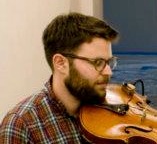The Music History and Theory Study Group Presents:
Ted Gordon
University of Chicago
Pauline Oliveros’ “Expanded Instrument System” as a Technology of the Self
Wednesday, May 31, 2017
Logan 802
4:30 – 6:00 PM
Note that there will be no material available for pre-circulation.
Minimalist composers in the 1960s often used the affordances of magnetic tape technologies for linear, iterative compositional techniques. Indeed, magnetic tape is often thought of as a linear medium. Yet Pauline Oliveros’ innovative use of magnetic tape machines in the late 1960s configured music as a non-linear, self-regulating process, one that highlighted the role of the performer’s body in a cybernetic circuit of musical signal. This paper argues that Oliveros’ “Expanded Instrument System” (EIS) subverted compositional techniques historically associated with minimalism, drawing attention to the role of the body as an integral part of musical practice.
Listening to Oliveros’ Beautiful Soop, made with an iteration of the EIS during her tenure at the Mills Tape Music Center, I show how the EIS facilitated an improvisatory encounter between the performer’s organs (ears, skin) and musical ones (oscillators, microphones). With the EIS, Oliveros’ intuitive gestures were recorded and “fed back” to her after a 6-8 second time delay; Oliveros would then use her own fed-back signal as the basis of reactionary improvisation. Rather than an iterative compositional process that removed the composer from performance, Oliveros’ use of tape delay configured the composer as a fleshy, embodied component of a real-time circuit of compositional and improvisational desire. Borrowing language from cybernetics, Oliveros described the EIS as a “very unstable, non-linear music making system.”
Drawing on archival and technical research at UC San Diego and Mills College, I show how Oliveros’s EIS invites complex philosophical questions about the technological and musical relationships between bodies, minds, and both electronic and traditional instruments—questions that have been central to recent musicological discussions about technology, technique, and embodiment.
Persons who believe they may require accommodations to participate fully in this event should contact the coordinator, Bradley Spiers at spiersb@uchicago.edu, in advance.
